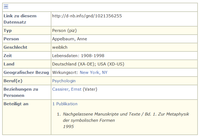
Kōshō (康正) was a Japanese era name after Kyōtoku and before Chōroku. This period spanned the years from July 1455 through September 1457. The reigning emperor was Go-Hanazono-tennō (後花園天皇).

Kenchō (建長) was a Japanese era name after Hōji and before Kōgen. This period spanned the years from March 1249 to October 1256. The reigning emperor was Go-Fukakusa-tennō (後深草天皇).
In information science, authority control is a process that organizes information, for example in library catalogs, by using a single, distinct spelling of a name (heading) or an identifier for each topic or concept. The word authority in authority control derives from the idea that the names of people, places, things, and concepts are authorized, i.e., they are established in one particular form. These one-of-a-kind headings or identifiers are applied consistently throughout catalogs which make use of the respective authority file, and are applied for other methods of organizing data such as linkages and cross references. Each controlled entry is described in an authority record in terms of its scope and usage, and this organization helps the library staff maintain the catalog and make it user-friendly for researchers.

The German National Library is the central archival library and national bibliographic centre for the Federal Republic of Germany. It is one of the largest libraries in the world. Its task is to collect, permanently archive, comprehensively document and record bibliographically all German and German-language publications since 1913, foreign publications about Germany, translations of German works, and the works of German-speaking emigrants published abroad between 1933 and 1945, and to make them available to the public. The DNB is also responsible for the Deutsche Nationalbibliografie and several special collections like the Deutsches Exilarchiv 1933–1945, Anne-Frank-Shoah-Bibliothek and the Deutsches Buch- und Schriftmuseum. The German National Library maintains co-operative external relations on a national and international level. For example, it is the leading partner in developing and maintaining bibliographic rules and standards in Germany and plays a significant role in the development of international library standards. The cooperation with publishers has been regulated by law since 1935 for the Deutsche Bücherei Leipzig and since 1969 for the Deutsche Bibliothek Frankfurt am Main.

The German Library in Frankfurt am Main (Deutsche Bibliothek abbreviated: DB) was a predecessor of the German National Library (DNB). From 1947 to 1990 it was the West German counterpart to the Deutsche Bücherei in Leipzig, founded in 1912, with the task of collecting German documents and publishing the national bibliography. After the reunification of Germany in 1990, the German Library and the German Library were merged to form "The German Library". Since 2006 it has been called the "German National Library". In 2006, around 8.3 million of the total holdings of the German National Library of 22.2 million units were stored in Frankfurt am Main. At the end of 2011, out of a total of around 27 million media copies, 10 million were archived in Frankfurt.

Taihō (大宝) was a Japanese era name after a late 7th century interruption in the sequence of nengō after Shuchō and before Keiun. This period spanned the years from March 701 through May 704. The reigning emperor was Monmu-tennō (文武天皇).

The German Music Archive in Leipzig, is the central collection of printed and recorded music and the music-bibliographic information centre for Germany. It is a Federal agency founded in 1970, tasked with collecting all music published in the country. Publishers of printed and recorded music in Germany are required by law to deliver two copies of every edition as legal deposits to the archive.
The Personennamendatei or PND is an authority file of people, which served primarily to access literature in libraries. The PND has been built up between 1995 and 1998 and was published by the German National Library (DNB) until 2012. For each person, there is a record with his or her name, birth and occupation connected with a unique identifier, the PND number.

The Virtual International Authority File (VIAF) is an international authority file. It is a joint project of several national libraries and operated by the Online Computer Library Center (OCLC).

The Gemeinsame Körperschaftsdatei or GKD is a German authority control for the organisation of corporation names from catalogues. It is used mainly for documentation in libraries. Like the Schlagwortnormdatei (SWD) and the Personennamendatei (PND), the GKD is looked after and updated by the German National Library (DNB), the Bavarian State Library, the Berlin State Library and, since 1997, the Austrian National Library, several library networks taking part. The responsible editor is the State Library in Berlin. The GKD was created in the 1970s from the catalogue data of the Zeitschriftendatenbank (ZDB). In April 2004, it contained more than 915,000 records.
The Schlagwortnormdatei or SWD is a controlled vocabulary index term system used primarily for subject indexing in library catalogs. The SWD is managed by the German National Library (DNB) in cooperation with various library networks. The inclusion of keywords in the SWD is defined by Regeln für die Schlagwortkatalogisierung (RSWK). Similar authority systems in other languages include the Library of Congress Subject Headings (LCSH) and the Répertoire d’autorité-matière encyclopédique et alphabétique unifié (RAMEAU). Since April 2012 the SWD is part of the Gemeinsame Normdatei (GND).
Knowledge extraction is the creation of knowledge from structured and unstructured sources. The resulting knowledge needs to be in a machine-readable and machine-interpretable format and must represent knowledge in a manner that facilitates inferencing. Although it is methodically similar to information extraction (NLP) and ETL, the main criterion is that the extraction result goes beyond the creation of structured information or the transformation into a relational schema. It requires either the reuse of existing formal knowledge or the generation of a schema based on the source data.
The LC Linked Data Service is an initiative of the Library of Congress that publishes authority data as linked data. It is commonly referred to by its URI: id.loc.gov.
Social Networks and Archival Context (SNAC) is an online project for discovering, locating, and using distributed historical records in regard to individual people, families, and organizations.
The Zeitschriftendatenbank or ZDB is the central bibliographical database for title and ownership records of ongoing collections in Germany and Austria, for example from trade journals, magazines and newspapers. The ZDB holds records of almost all German scientific libraries and many other public libraries and is freely available on the Internet. The journal database is managed by the Staatsbibliothek zu Berlin (SBB) in cooperation with the Deutsche Nationalbibliothek (DNB), the German National Library, which is responsible for the technical system support and further development.
The Maschinelles Austauschformat für Bibliotheken or MAB is a bibliographic data exchange format.

The German so called Schlagwortkatalog or SWK is a library catalog, which lists the publications according to descriptor keywords and thus allows selective thematic searches for literature. A keyword is understood to be a natural language expression that reproduces the content of the publication as briefly but precisely as possible. Complex content can be described using a syntactical keyword chain, a combination of several individual keywords. The sub-keywords are not only used for targeted research, but also allow the catalog user to see whether the document found is relevant to him. While earlier keyword catalogs were kept as an independent card catalog, the search option for keywords is integrated in modern OPACs.
Suzanne Honoré (1909-2000) was a French librarian, archivist and historian for decades at the National Library of France. She was also known as Suzanne Duvergé. She was conferred with honorific awards in recognition of her input to librarianship. These awards were: Commander of the Order of Academic Palms, Ordre national du Mérite, Legion of Honor, Officer of the Legion of Honor in 1958, 1960, and 1976 respectively.

Kai Remlov is a Norwegian actor. He has been engaged with the National Theater in Oslo since 1973, including at its Torshov Theater.









